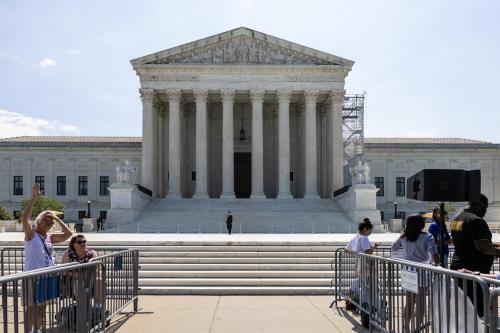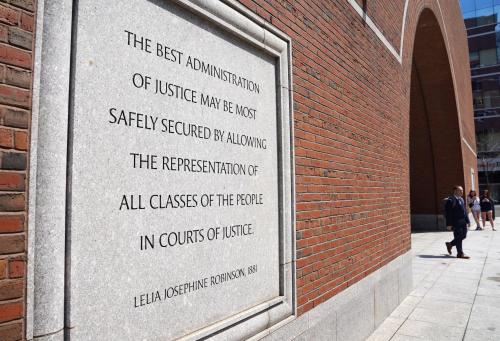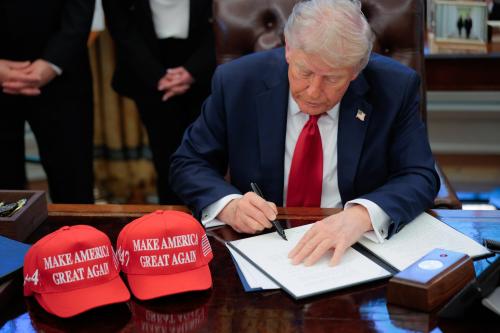The balance of power between the executive, legislative, and judicial branches has swayed in recent years. In the first Trump administration, courts paused the administration’s rescission of Deferred Action for Childhood Arrivals (DACA)—a policy that provided deportation protection for young undocumented immigrants. The Biden administration also saw courts restrain its ability to deliver on education policy promises like loan forgiveness and Title IX protections for transgender students.
Then, in 2024, came Loper Bright v. Raimondo (“Loper”). Through the case, the Supreme Court further restricted the executive branch, giving more power to the courts on issues where federal agencies interpret statutes. Now, as the second Trump administration settles into power, Loper offers a new legal framework that could restrain an administration seeking to expand executive power. However, it exists at a time when the Supreme Court seems content to provide the Trump administration a fair amount of discretion (e.g., allowing the administration to dismiss Department Education staff).
Federal education policy: An evolving landscape
The second Trump administration has attempted to implement significant shifts in federal education policy. The Republican-held Congress is working closely with the administration to facilitate its federal education policy goals. On July 4, 2025, the president signed into law the “Big Beautiful Bill” after it narrowly passed the House and Senate. The law introduces reforms to higher education finance and federal student aid that align with the administration’s promises to reshape higher education, which it has described as “woke” and excessively focused on DEI initiatives. The law also cuts funding for K-12 schools and promotes privatization. Federal agencies will now be tasked with the implementation of the law. This can include issuing rules, regulations, and policies.
A hallmark of federal education policy under the current administration is its continuously shifting priorities, making federal education policy more volatile or, at times, contradictory. Take, for example, the U.S. Department of Education. After promising on the campaign trail to eliminate this agency, President Trump signed an executive order to begin shuttering the department in March 2025. Yet, the federal Education Department still very much exists—and in July 2025 concluded a negotiated rulemaking session on Public Service Loan Forgiveness. This shows how the administration can, through executive action, create circumstances in which the agency’s business-as-usual can take place even in unusual times.
Revisiting Loper under the evolving landscape
The evolving federal education policy landscape gives new significance to Loper. Loper overturned Chevron v. Natural Resources Defense Council (1984), which had previously enabled courts to defer to administrative agency interpretations when statutes were ambiguous and the agency’s interpretation was reasonable. For instance, the Fourth Circuit gave deference to the Department of Education’s interpretation of Title IX when the agency, under President Obama, interpreted the statute to entitle transgender students to use the restroom that aligned with their gender identity. In a recent article, we connected Loper to ongoing efforts by the courts to roll back executive power during the Biden administration’s tenure. This typically meant that the courts paused Biden-era policies or proposals, such as trying to create regulations for DACA, extending Title IX protections to transgender students, or effectuating loan forgiveness. At times, courts paused these efforts before they went into effect.
Since the case was decided in 2024, Loper has been cited by courts as justification to restrain executive agency actions relating to education. In Tennessee v. Cardona (2025), a federal district court in Kentucky cited Loper to state that the court would employ “its independent judgment in interpreting Title IX,” before holding that a Department of Education regulation “impermissibly redefine[d] discrimination on the basis of sex for purposes of Title IX” and “must be set aside.” In Missouri v. Trump (2025) (previously Missouri v. Biden), the Eighth Circuit Court of Appeals barred the Department of Education from canceling student loans under the Saving on a Valuable Education (SAVE) program. In its opinion, the Eighth Circuit cited Loper to state that an executive agency’s interpretation of a statute should receive “respect” but “not supersede” a court’s interpretation.
Additionally, some litigants have cited Loper in their arguments in favor of restraining other types of executive actions. This includes sub-regulatory guidance, which refers to agency statements that are not regulations but explain how the agency is interpreting the law. For example, in the case of National Education Association v. U.S. Department of Education, the plaintiffs cited Loper to argue that the court should not accept the Department of Education’s interpretation of Title VI as presented in a “Dear Colleague” letter directing educational institutions to discontinue certain diversity practices. Litigants have also cited Loper in cases involving reductions in agency personnel (see New York v. McMahon), and implementation of a presidential directive against school-based DEI programs (see New York v. U.S. Department of Education). Thus, although courts deciding education cases typically cited it to side with Trump administration policy priorities, litigants have been arguing to apply Loper’s holding to restrict the administration’s executive actions.
Courts adjudicating issues outside of education have also adopted a similar approach. For instance, Loper has been cited in the immigration context to cabin the executive branch and restore balance between branches when they deem the president has gone too far through executive action. In Abrego Garcia v. Noem (2025), the court mandated that the administration facilitate the return of Kilmar Abrego Garcia, who was removed from the U.S. via an administrative error. In ruling this way, the court noted, “We are not bound in this context by a definition crafted by an administrative agency and contained in a mere policy directive.”
Citing Loper to restore separation of powers
Under the new administration, we have seen a proliferation of executive action to create policy, even without the use of agency statutory interpretation. Arguably, Loper may not apply directly, because a narrow reading of the case is that by overturning Chevron, courts no longer must defer to reasonable agency interpretations of statutes (e.g., regulations, guidance, and policies) when these are vague. But as the cases above illustrate, courts can use it—and have used it—analogously to restrain executive overreach.
To be clear, there are real questions about Loper and its impact. For instance, it may lead courts to tilt power toward themselves in a way that does not allow the executive branch to function within its discretion. Moreover, on July 14, 2025, the Supreme Court—without explaining its reasoning—issued a ruling that allows the Trump administration to move forward with dismissing Education Department staff. That provides more reason for skepticism about the Court’s willingness to use Loper to restrict the executive branch or allow lower courts to do so. At this point, it’s hard to tell. It’s worth keeping in mind, though, that Loper remains the law. This Court has issued many rulings that align with the policy preferences of the Trump administration, but there have been exceptions—and, the Supreme Court, as the highest court in the land, only hears and rules on about 60 to 80 cases per year. This means that lower courts will continue to have significant influence as they rule on a larger proportion of cases.
As such, we believe that Loper offers a leverage point for courts at a time when the executive branch is exerting expansive authority and the separation of powers is threatened.
The Brookings Institution is committed to quality, independence, and impact.
We are supported by a diverse array of funders. In line with our values and policies, each Brookings publication represents the sole views of its author(s).








Commentary
Loper ruling reshapes balance of power in education
July 28, 2025